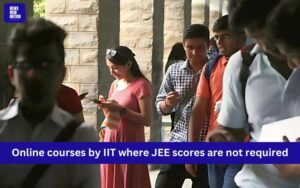
The Central Board of Secondary Education (CBSE) is gearing up to revolutionize the Indian education system with the introduction of a CBSE’s new credit system in schools, slated to be implemented from the academic session 2024-25. This transformative initiative is designed to bestow 40 credit points upon students who successfully complete a minimum of 1200 hours of study in each class, spanning from the 6th to the 12th grade. These credit points will not only find their place on the students’ mark sheets but will also be digitally stored in the Bank of Credit, facilitated by Digi Locker.
The inspiration for this credit system draws from its successful implementation in higher education. In this context, the credits have empowered students with the freedom to switch institutes or courses seamlessly. Now, the CBSE is extending this advantage to the secondary and senior secondary levels, intending to establish a dynamic equilibrium between vocational and general studies.
This novel credit system is a departure from the conventional academic assessment methodologies. It disregards the traditional emphasis on specific subjects, skills, or non-academic engagements, focusing instead on the broader spectrum of a student’s workload during study. This forward-thinking approach not only recognizes the diversity in students’ learning paths but also provides a platform for facile transitions between various educational trajectories.
The proposed credit system is envisioned to be a catalyst for change, allowing students the flexibility to modify their subjects with ease. This adaptability is expected to bring about a harmonious coexistence between vocational and general education, breaking down barriers that might hinder students from exploring diverse fields.
Should the implementation begin in the upcoming academic session (2023-24), students in classes 9-10 will be entitled to 7 credits for each of the five subjects, including two language subjects. Additional credits will be allocated for Physical Education and Art Education, summing up to a total of 40 credits. Similarly, for classes 11-12, students will amass credits for language and other subjects, offering a comprehensive structure for their academic journey.
The CBSE’s proposal introduces a pivotal shift in the mandatory subjects for students in class 9 and 10, making 10 subjects compulsory. This count is increased to 6 subjects for students in class 11 and 12, a departure from the current norm of 5 subjects. This change aligns with the National Credit Framework, categorizing 10th pass students as Credit Level-3 and 12th pass students as Credit Level-4.
In this transformative educational landscape, students are not confined merely to academic subjects. The proposal encourages them to explore additional academic subjects, acquire new skills, or engage in non-academic activities such as NCC, NSS, Olympiads, sports, music, and drama, allowing them to accumulate more credits.
Alongside these sweeping educational reforms, there are discussions regarding the possibility of conducting board exams twice a year, incorporating a semester system for classes 10th to 12th. Furthermore, new NCERT books for classes 3 to 6 and 9 to 11 are anticipated to be released before the commencement of the academic session 2024-25.
In essence, the proposed changes represent a paradigm shift in the educational landscape of India. The CBSE’s visionary approach seeks to create a system that not only adapts to the evolving needs of students but also fosters a holistic and inclusive environment. The emphasis on flexibility, exploration, and a balanced approach to education aims to prepare students for a future where diverse skills and knowledge are equally valued. As the nation braces for these transformative reforms, the educational journey of Indian students is poised to become more dynamic and enriched.
These proposed changes aim to enhance the education system’s adaptability and balance between vocational and general studies, giving students the flexibility to explore diverse subjects and activities while accumulating credits that can shape their academic journey.










